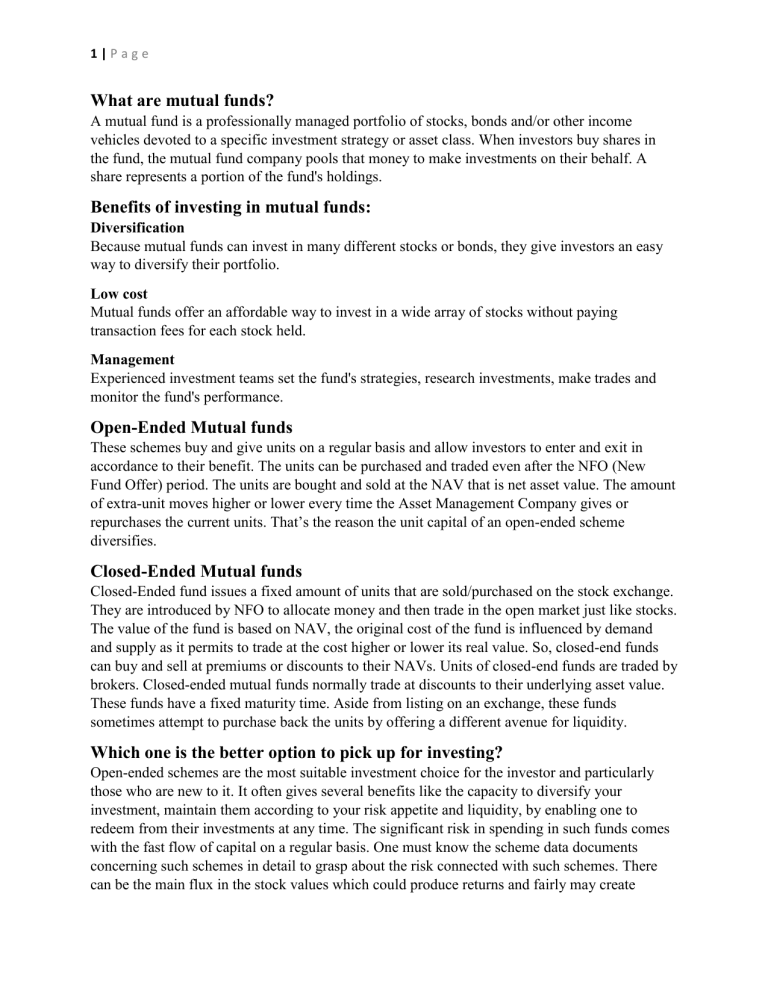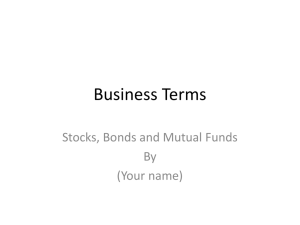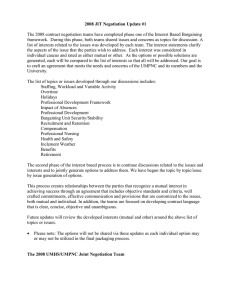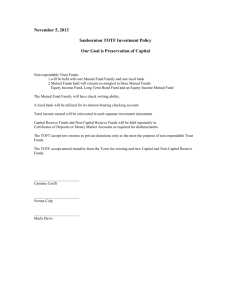
1|Page What are mutual funds? A mutual fund is a professionally managed portfolio of stocks, bonds and/or other income vehicles devoted to a specific investment strategy or asset class. When investors buy shares in the fund, the mutual fund company pools that money to make investments on their behalf. A share represents a portion of the fund's holdings. Benefits of investing in mutual funds: Diversification Because mutual funds can invest in many different stocks or bonds, they give investors an easy way to diversify their portfolio. Low cost Mutual funds offer an affordable way to invest in a wide array of stocks without paying transaction fees for each stock held. Management Experienced investment teams set the fund's strategies, research investments, make trades and monitor the fund's performance. Open-Ended Mutual funds These schemes buy and give units on a regular basis and allow investors to enter and exit in accordance to their benefit. The units can be purchased and traded even after the NFO (New Fund Offer) period. The units are bought and sold at the NAV that is net asset value. The amount of extra-unit moves higher or lower every time the Asset Management Company gives or repurchases the current units. That’s the reason the unit capital of an open-ended scheme diversifies. Closed-Ended Mutual funds Closed-Ended fund issues a fixed amount of units that are sold/purchased on the stock exchange. They are introduced by NFO to allocate money and then trade in the open market just like stocks. The value of the fund is based on NAV, the original cost of the fund is influenced by demand and supply as it permits to trade at the cost higher or lower its real value. So, closed-end funds can buy and sell at premiums or discounts to their NAVs. Units of closed-end funds are traded by brokers. Closed-ended mutual funds normally trade at discounts to their underlying asset value. These funds have a fixed maturity time. Aside from listing on an exchange, these funds sometimes attempt to purchase back the units by offering a different avenue for liquidity. Which one is the better option to pick up for investing? Open-ended schemes are the most suitable investment choice for the investor and particularly those who are new to it. It often gives several benefits like the capacity to diversify your investment, maintain them according to your risk appetite and liquidity, by enabling one to redeem from their investments at any time. The significant risk in spending in such funds comes with the fast flow of capital on a regular basis. One must know the scheme data documents concerning such schemes in detail to grasp about the risk connected with such schemes. There can be the main flux in the stock values which could produce returns and fairly may create 2|Page losses. On the other hand, close-ended funds are traded just like any additional stock on an exchange which makes it uneasy for an inexperienced investor. Liquidity is also weak because of which trading off one’s units can be hard even if one is in a monetary emergency. No one has experienced on the variations between the two types of mutual fund investments, one can go forward and examine the investments market. Though, it is essential that one differentiate products within the various types of mutual funds to make the most suitable selection.





